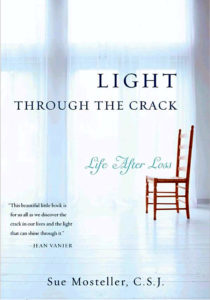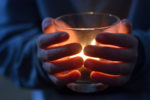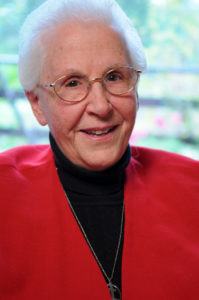Light Through the Crack: Life After Loss by Sue Mosteller
(Doubleday Books: 2006)
Review by Laura Locke
Sometimes you read a book that triggers some inner healing. For me, Sue Mosteller’s Light Through the Crack: Life After Loss is one of those books.
 Sister Sue Mosteller, C.S.J. is an author, teacher and popular speaker who lives in Toronto with the Sisters of St. Joseph. She is also the executrix of author Henri Nouwen’s literary estate, whom she met when they both lived in the L’Arche Daybreak Community in Toronto. L’Arche (French for “the ark”) is an international organization with communities in 38 countries, in which people with and without intellectual disabilities share life together. Mosteller lived at L’Arche Daybreak for 40 years, and also travelled the world for nine years as International Coordinator of L’Arche.
Sister Sue Mosteller, C.S.J. is an author, teacher and popular speaker who lives in Toronto with the Sisters of St. Joseph. She is also the executrix of author Henri Nouwen’s literary estate, whom she met when they both lived in the L’Arche Daybreak Community in Toronto. L’Arche (French for “the ark”) is an international organization with communities in 38 countries, in which people with and without intellectual disabilities share life together. Mosteller lived at L’Arche Daybreak for 40 years, and also travelled the world for nine years as International Coordinator of L’Arche.
Light Through the Crack: Life After Loss takes its title from the lines that Leonard Cohen penned in his song “Anthem”:
Ring the bells that still can ring
Forget your perfect offering
There is a crack in everything
That’s how the light gets in.
In this her third book, Mosteller explores the paradox of how our painful humiliations and sorrows – the “cracks” in our life experiences – can be illuminating and transformational.
If you’ve ever been lucky enough to hear Mosteller speak, you’ll know she is a very engaging, enthusiastic storyteller (check her out on YouTube). This book offers further evidence of that talent, as each chapter features a vivid story that Mosteller has encountered in her active, rich life. They include the story of a young couple faced with the news that their unborn child will die soon after birth; a man who lives his life harbouring deep anxiety because of a family secret; a respected leader who faces humiliation and ruined relationships because of his own actions. Each story touches on issues we all share; deep-seated fears, recriminations and insecurities. And as a frame to each story, Mosteller reflects on an area of brokenness in her own life.
Just as her friend Henri Nouwen had the humility to examine and share his own chronic anxieties and emotional burdens with his readers, so does Mosteller. Nouwen used the energy of his inner battles as fuel in his lifelong journey towards wholeness and self-acceptance, and managed to live in genuine community and love despite – or perhaps because of – his woundedness. He also came to realize that wholeness doesn’t mean perfection, and indeed, that brokenness is an integral part of all our lives.
Like Nouwen, Mosteller has come to recognize and embrace the power of transparency, as she openly discusses her struggles. Describing relationships in her immediate family, her life as a Sister of St. Joseph, and her years living and working at L’Arche Daybreak, she writes with candour about both the joys and challenges:
“It’s impossible to live with people over the long term and hide the vulnerabilities and the cracks. So many of the people in all three groups know my fears, my self-righteousness, my need to control or fix things and people, my addiction to food, and my very fragile self-image.” (1)
Reading the seven stories in this book, as well as Mosteller’s touching, sincere reflections on her own journey, gave me courage. I found myself making a mental list of all my habitual weaknesses, and then having a good, honest look at each one. Ephesians 5:13 came to mind: “Everything the light shines on can be seen, and everything that the light shines on becomes a light.” I started to think about the areas in my life that have held me back from living fully – my fears, obsessions, addictions and worries – and asked God for His help and healing.
 Mosteller also led me to think about the importance of recollecting the people and events in our lives that have taught us something important. Imagine if we stopped being embarrassed about sharing our stories that have perhaps brought us a measure of shame and regret – but also valuable self-knowledge. It’s in the telling that we grow, and it’s in the hearing that others grow. When we all become storytellers, laughing together at our foibles and fears, true community starts to happen.
Mosteller also led me to think about the importance of recollecting the people and events in our lives that have taught us something important. Imagine if we stopped being embarrassed about sharing our stories that have perhaps brought us a measure of shame and regret – but also valuable self-knowledge. It’s in the telling that we grow, and it’s in the hearing that others grow. When we all become storytellers, laughing together at our foibles and fears, true community starts to happen.
Mosteller, in this beautifully written and brave book, challenges us to join her in accepting our “amazing identity as beloved, fragile children of God”.(2) She models how to make use of our pain and stand with others in the freedom and peace that comes with truth. And she shows us that there is abundant fruit to be harvested as we commit to looking for the light.
- Mosteller, Sue, (2006); Light Through the Crack: Life After Loss; Doubleday; p. 3
- Ibid; p. 45








